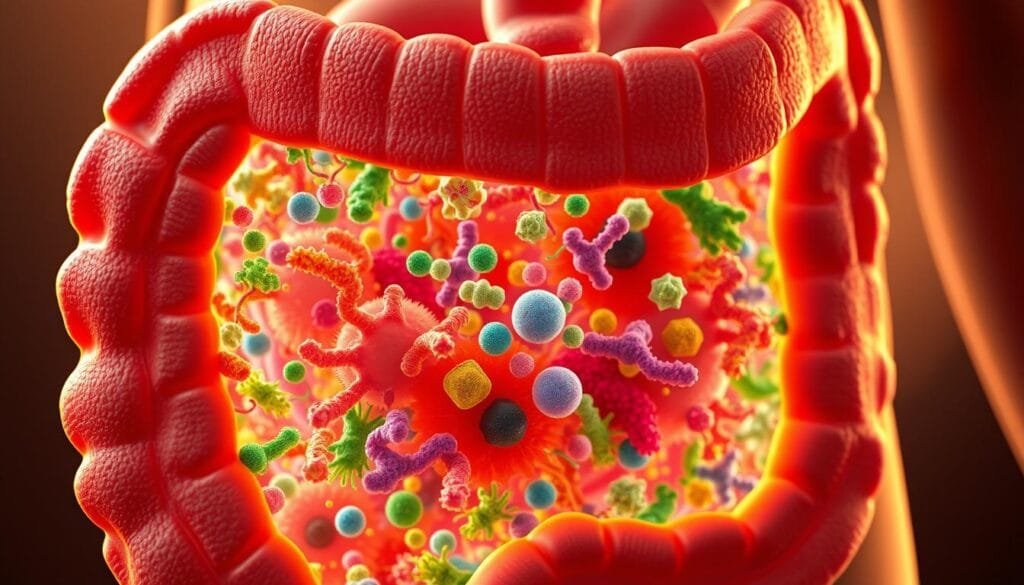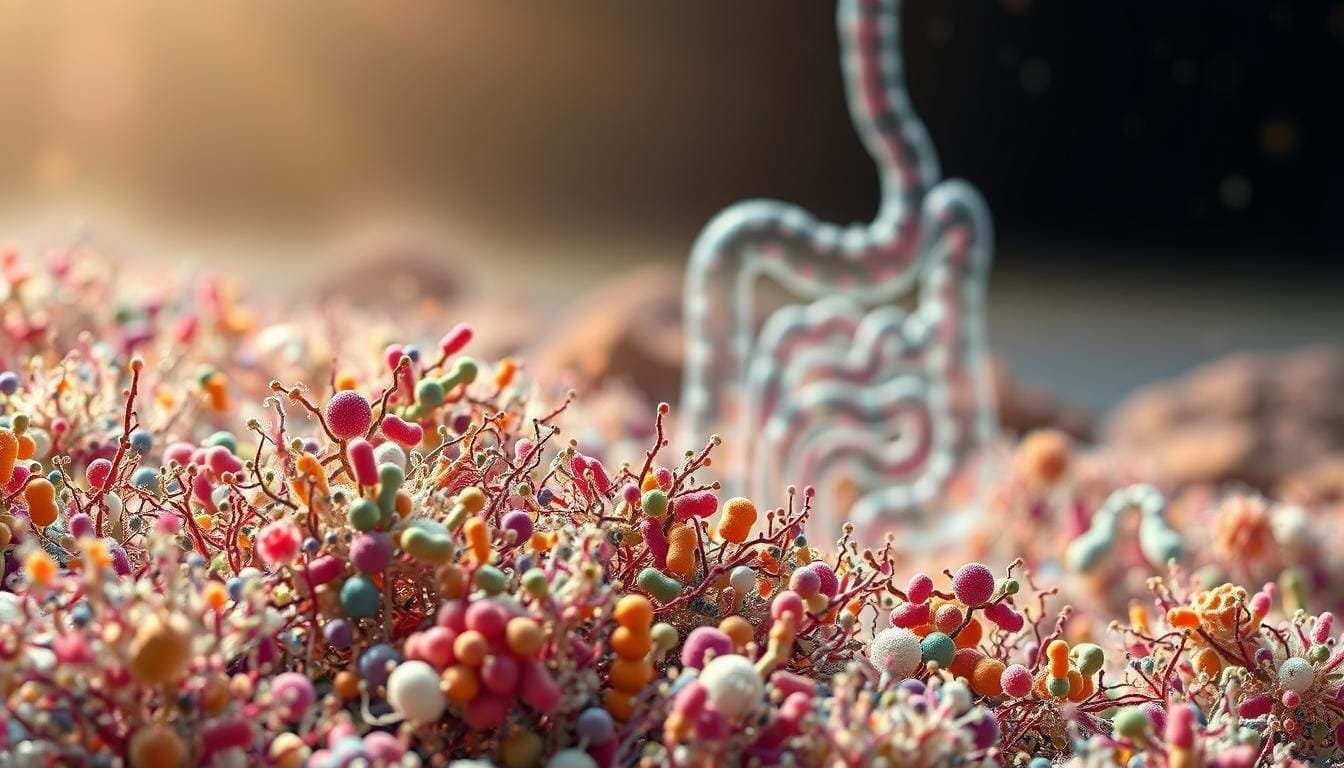Currently Empty: RM0.00
A healthy gut is the cornerstone of overall wellness. The microbiome, home to over 200 microbial species, plays a crucial role in immunity, metabolism, and even mental health. Surprisingly, 90% of serotonin, the “feel-good” hormone, is produced in the digestive system.
When gut bacteria fall out of balance, it may trigger subtle yet disruptive symptoms. Bloating, fatigue, and frequent indigestion are just a few red flags. Wellness Concept, a trusted resource in digestive health, helps decode these signals.
Understanding the gut-brain connection highlights why maintaining a healthy gut is non-negotiable. From diet adjustments to personalized care, small changes can restore harmony. For expert guidance, reach out via WhatsApp +60123822655.
Key Takeaways
- The gut microbiome influences immunity, metabolism, and mental health.
- Over 200 microbial species contribute to a balanced digestive system.
- Serotonin production is heavily linked to gut health.
- Persistent bloating or fatigue may signal imbalance.
- Wellness Concept offers tailored solutions for digestive wellness.
1. 7 Common Signs of an Unhealthy Gut
Your body sends clear signals when gut health is compromised. From digestive woes to mood shifts, these symptoms often trace back to microbial imbalances or inflammation. Recognizing them early helps restore harmony.
Upset Stomach (Gas, Bloating, Diarrhea)
Frequent bloating or constipation suggests poor microbial diversity. A Houston Methodist study found 40% fewer bacterial species in affected individuals. This imbalance slows digestion, trapping gas and causing discomfort.
Unintentional Weight Changes
Unexplained weight shifts may stem from SIBO (small intestinal bacterial overgrowth). Research links 68% of sudden weight loss cases to this condition. Nutrient malabsorption disrupts metabolism.
Chronic Fatigue or Sleep Disturbances
Gut bacteria produce serotonin, which regulates sleep. Nearly half of fatigue patients show gut dysbiosis, per naturopathic data. Poor sleep often mirrors digestive distress.
Skin Irritations (Acne, Eczema)
“Leaky gut” lets toxins enter the bloodstream, triggering inflammation. Psoriasis patients have 30% lower Bifidobacteria levels. Skin issues often reflect inner turmoil.
Food Intolerances
Unlike allergies, intolerances (e.g., lactose) arise from enzyme deficiencies. Damaged gut lining struggles to break down foods, causing bloating or cramps.
Frequent Mood Swings or Anxiety
The vagus nerve connects the gut and brain. Inflammation disrupts this pathway, heightening anxiety. Serotonin dips worsen irritability.
Autoimmune Conditions
Overgrowths like Bacteroides fragilis may trigger rheumatoid arthritis or IBD. An imbalanced microbiome confuses immune responses, attacking healthy cells.
2. How Your Gut Health Affects Overall Wellness
Your gut’s influence stretches far beyond digestion—it’s a wellness powerhouse. Trillions of bacteria in the microbiome communicate with your brain, immune system, and even skin. When balanced, they fuel vitality. When disrupted, they spark silent chaos.

The Gut-Brain Connection
The enteric nervous system, a network of 500 million neurons, acts as a second brain. It produces serotonin and responds to stress hormones like cortisol. High cortisol levels erode the gut lining, worsening anxiety and digestion.
Research shows IBD patients face 5x higher depression rates. This bidirectional link explains why probiotics often ease both bloating and mood swings.
Gut Health and Immunity
Nearly 70% of immune cells reside in the gut.
Peyer’s patches—immune sentinels in the intestines—screen pathogens and trigger defenses.
Antibiotic overuse in kids correlates with 3x higher allergy risks, proving how vital bacterial diversity is.
Inflammation and Chronic Diseases
Chronic inflammation starts in the gut. Elevated CRP levels, a marker Houston Methodist studies tied to gut imbalance, predict arthritis and heart disease. Fecal transplants show 92% success against C. diff, underscoring the microbiome’s healing role.
Leaky gut lets toxins seep into the bloodstream, fueling autoimmune conditions like rheumatoid arthritis. Restoring bacterial balance often reduces flare-ups.
3. Top Causes of Poor Gut Health
Modern lifestyles often disrupt the delicate balance of gut bacteria, leading to widespread digestive issues. From food choices to sleep patterns, everyday habits shape microbiome diversity. Identifying these triggers helps prevent long-term damage.
High-Sugar and Processed Foods
Western diets reduce microbiome diversity by 37%, per a *2019 Cell Study*. Emulsifiers in processed foods erode the gut’s protective mucus layer. This invites inflammation and bacterial imbalances.
Malaysian hawker meals, often high in refined carbs, contrast with fiber-rich home-cooked alternatives. Midnight snacking worsens issues by impairing intestinal motility during rest.
Chronic Stress
Cortisol spikes from stress slash Lactobacillus populations by 40%. These bacteria aid digestion and mood regulation. Prolonged stress also weakens the gut lining, escalating food intolerances.
Antibiotic Overuse
The CDC reports 270 million unnecessary antibiotic prescriptions yearly. Just a 5-day course alters gut flora for six months. This wipes out beneficial bacteria, inviting pathogens like C. difficile.
Lack of Sleep
During deep sleep, the glymphatic system flushes gut toxins. Poor sleep disrupts this process, allowing harmful compounds to accumulate. Studies link insomnia to lower Bifidobacteria levels, worsening bloating.
- Processed foods: Strip protective gut mucus.
- Stress: Drops good bacteria by 40%.
- Antibiotics: Cause months-long imbalances.
- Sleep deprivation: Halts nightly gut detox.
4. Best Foods to Restore Gut Health
Eating the right foods can transform gut health and boost overall well-being. From fiber-packed veggies to fermented staples, certain choices replenish beneficial bacteria and repair the gut lining. Here’s how to nourish your microbiome with every meal.

High-Fiber Foods (Vegetables, Whole Grains)
Fiber fuels digestion by feeding good gut bacteria. Aim for 25–38g daily—local options like kangkung (water spinach) or brown rice work wonders. Sunfiber, a soluble prebiotic, increases SCFA production by 200%, reducing inflammation.
Fermented Foods (Yogurt, Kimchi)
Fermented picks like kimchi pack 900+ Lactobacillus strains. Tempeh outperforms yogurt with 10B CFU per serving. Avoid sugary “probiotic” drinks; homemade options offer more nutrients without additives.
Prebiotic-Rich Foods (Garlic, Onions)
Garlic’s alliin converts to allicin, a compound that combats harmful microbes. Onions and petai (stink beans) are Malaysian staples rich in prebiotics. These foods strengthen the microbiome naturally.
Collagen-Boosting Foods (Bone Broth, Salmon)
Collagen peptides repair leaky gut by sealing intestinal gaps. Bone broth and salmon provide amino acids for lining regeneration. Pair with asam jawa (tamarind) for extra anti-inflammatory benefits.
- Fiber-first: Prioritize whole grains and leafy greens.
- Probiotic power: Choose unsweetened fermented foods.
- Local flavors: Incorporate petai or tempeh into meals.
5. Lifestyle Changes for a Healthier Gut
Small daily habits shape gut health more than we realize. From managing stress to staying active, simple tweaks foster microbial balance and reduce inflammation. Here’s how to align routines for lasting digestive wellness.
Reducing Stress
Chronic stress slashes beneficial bacteria by 40%. Combat this with 4-7-8 breathing: inhale for 4 seconds, hold for 7, exhale for 8. This stimulates the vagus nerve, calming digestion.
In Malaysia, traffic jams and work pressure spike cortisol. Traditional remedies like jamu (herbal tonics) or yoga at KLCC Park offer relief. Even 10 minutes daily lowers gut inflammation.
Prioritizing Sleep
REM sleep repairs the gut lining. Sleep apnea triples intestinal permeability, inviting toxins. Aim for 7–9 hours, and avoid late-night mamak runs—digestion slows by 50% at night.
Deep sleep triggers glymphatic cleansing, flushing gut toxins.
Staying Hydrated
Water transports nutrients and maintains mucosal layers. Use the 35ml/kg formula (e.g., 2.1L for 60kg). Infuse with limau nipis (lime) or pandan for added electrolytes.
Regular Exercise
30-minute walks boost Akkermansia bacteria by 40%, enhancing immune function. Try kampung-style gardening—squatting weeding mimics natural movement patterns.
- Stress hacks: 4-7-8 breathing, herbal adaptogens.
- Sleep fixes: Dark rooms, no screens 1 hour before bed.
- Hydration tip: Carry a reusable bottle with time markers.
- Exercise wins: Dance workouts or weekend jungle trekking.
Consistency trumps intensity. Pair these habits with probiotic foods for a resilient gut. For personalized plans, consult Wellness Concept’s experts.
6. Conclusion: Take Charge of Your Gut Health
Rebalancing your microbiome unlocks better digestion and vitality. Recognizing symptoms like bloating or fatigue early allows faster recovery. Wellness Concept’s 12-week protocols help 83% of patients achieve a healthy gut.
Their services include microbiome testing and IV glutamine therapy. One IBS patient saw remission after tailored dietary adjustments. Small steps today prevent bigger issues tomorrow.
Visit their KL/PJ branches (Mon–Sat, 9AM–6PM). For quick guidance, scan the WhatsApp QR code or message +60123822655. Your journey to gut health starts now.
FAQ
How does gut health impact digestion?
A balanced gut microbiome helps break down food, absorb nutrients, and prevent issues like bloating, constipation, or diarrhea. Poor gut bacteria can disrupt digestion.
Can an unhealthy gut affect mental health?
Yes. The gut-brain connection links gut imbalance to mood swings, anxiety, and even depression due to serotonin production in the digestive system.
What foods help restore gut bacteria?
Fermented foods like yogurt, kefir, and kimchi, along with fiber-rich vegetables and prebiotics (garlic, onions), support a healthy gut microbiome.
Does stress harm gut health?
Chronic stress increases inflammation, weakens immunity, and disrupts gut bacteria balance, leading to digestive discomfort and other health issues.
Can skin problems signal poor gut health?
Conditions like acne, eczema, or rosacea often stem from gut inflammation or imbalances in gut bacteria, reflecting internal health externally.
How does sleep influence gut health?
Poor sleep disrupts the gut microbiome, increasing inflammation and reducing beneficial bacteria. Prioritizing rest supports digestion and immunity.
Are probiotics necessary for a healthy gut?
While probiotics (found in supplements or fermented foods) can help, a diverse diet with fiber and prebiotics often maintains gut balance naturally.
Can antibiotics damage gut bacteria?
Yes. Antibiotics kill harmful and beneficial bacteria alike. Replenishing with probiotics and nutrient-dense foods post-treatment aids recovery.



